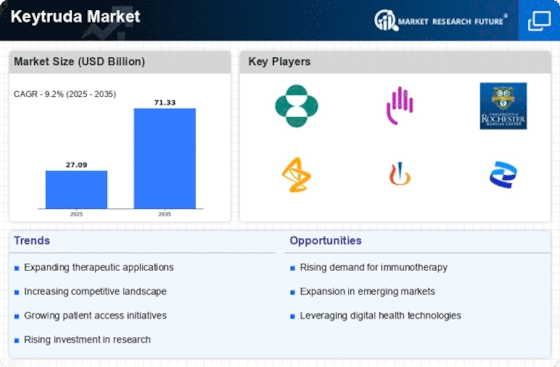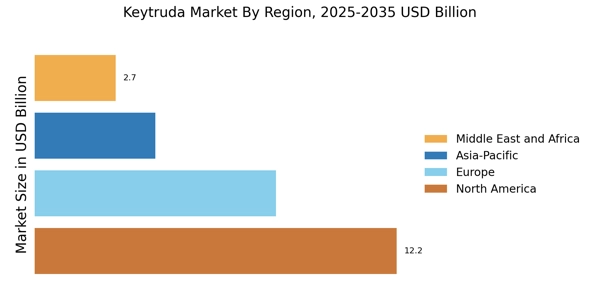Rising Incidence of Cancer
The increasing incidence of various cancer types, particularly lung cancer, melanoma, and head and neck cancers, is a primary driver for the Keytruda Market. According to recent statistics, cancer cases are projected to rise significantly, with estimates suggesting that by 2025, the number of new cancer cases could reach over 19 million annually. This surge in cancer prevalence necessitates effective treatment options, thereby propelling the demand for immunotherapies like Keytruda Market. As healthcare systems strive to address this growing burden, the Keytruda Market is likely to experience substantial growth, driven by the need for innovative therapies that can improve patient outcomes and survival rates.
Advancements in Immunotherapy
The Keytruda Market is significantly influenced by advancements in immunotherapy, which have revolutionized cancer treatment paradigms. Keytruda Market, as a PD-1 inhibitor, has demonstrated remarkable efficacy in various malignancies, leading to its approval for multiple indications. The ongoing research and development efforts in the field of immunotherapy are expected to yield new combinations and treatment regimens, further enhancing the therapeutic landscape. Market data indicates that the immunotherapy segment is anticipated to grow at a compound annual growth rate (CAGR) of over 15% through the next several years. This growth is indicative of the increasing reliance on immunotherapeutic agents like Keytruda Market, which are becoming integral to cancer management strategies.
Regulatory Approvals and Guidelines
The Keytruda Market is positively impacted by the evolving regulatory landscape, which has seen an increase in approvals for new indications and combination therapies. Regulatory bodies are increasingly recognizing the potential of Keytruda Market in treating various cancers, leading to expedited approvals and favorable guidelines. For instance, recent approvals for Keytruda Market in combination with chemotherapy for first-line treatment of non-small cell lung cancer have expanded its market reach. This trend is likely to continue, as regulatory agencies prioritize innovative therapies that demonstrate significant clinical benefits. Consequently, the Keytruda Market is expected to thrive as more treatment options become available, aligning with the growing demand for effective cancer therapies.
Increased Investment in Cancer Research
Investment in cancer research and development is a crucial driver for the Keytruda Market. Pharmaceutical companies and research institutions are allocating substantial resources towards the discovery and development of novel cancer therapies, including immunotherapies. This influx of funding is fostering innovation and accelerating clinical trials, which are essential for bringing new treatments to market. Market analysis suggests that the oncology research sector is projected to receive billions in funding over the next few years, with a significant portion directed towards immunotherapy research. As a result, the Keytruda Market stands to benefit from this heightened focus on cancer research, leading to the introduction of new treatment options and improved patient care.
Growing Demand for Personalized Medicine
The shift towards personalized medicine is reshaping the Keytruda Market, as healthcare providers increasingly seek tailored treatment approaches for cancer patients. Keytruda Market's mechanism of action, which targets specific pathways in the immune system, aligns well with the principles of personalized medicine. The demand for biomarker testing and companion diagnostics is on the rise, enabling clinicians to identify patients who are most likely to benefit from Keytruda Market. Market data indicates that the personalized medicine segment is expected to grow significantly, with projections suggesting a CAGR of over 10% in the coming years. This trend underscores the importance of precision oncology, positioning Keytruda Market as a pivotal player in the evolving landscape of cancer treatment.

















